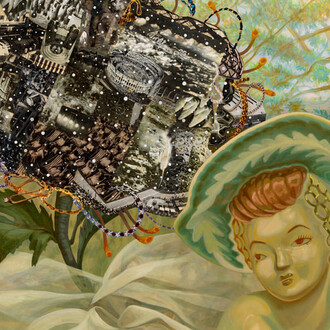. . .Ecstatic consciousness as way of overcoming a belligerent realism, to form new subjectivities.
(Mustafa Hulusi)
Dirimart is delighted to present Breathing in the world, the second solo exhibition by London-born and -based artist Mustafa Hulusi at the gallery. For this exhibition, Hulusi presents blissful photorealist paintings of the natural world of fruits and flowers, which subtly pose a paradoxical question: how is it that we undergo experiences that are deeply pleasurable while experience a sense of dread, as if something sits off-screen?
In his practice, Mustafa Hulusi interrogates what is indigenous to a culture, and what is alien, and how the connection between the two unravels in the age of simulacra and simulation. In parallel, Breathing in the world comprises a suite of figurative oil paintings of various sizes, surrounding the viewer as if within an Arcadian idyll – idealised and unsustainable – accompanied by a sound work. The soft, painterly style invites a kind of crystalline clarity, presenting a sense of otherworldliness, where a bountiful fertility might provide what one desires – Hulusi’s concerns are cosmological.
A significant reference point for the artist lies in the Romantic poets of nineteenth-century Britain. In the midst of the contemporaneous socio-psychic destruction of the industrial revolution, they responded through other forms of consciousness – ecstatic states, often induced by opium, steeped in allegory.
The header quote above is a reference to the works of cultural theorist Mark Fisher’s notion of anhedonia: a state where pleasure-seeking within the designated realms of capital becomes so overwhelming that it cancels out any potential for enjoyment. It represents an irreparable loss, an inability to obtain an authentic state.
Many of the images originate from Cyprus, the geographic origin of the artist. From the early 20th century, the colonial administration governing the island directed it towards becoming an enhanced small holder-owned farming plantation, driving the economy through the export of crops including citrus, carab, tobacco, and watermelons. There is a connection with the orange farms of Jaffa within British Mandate Palestine traced to the 1930s and the Palestinian strain of the orange trees planted in Cyprus. Today, only a much smaller percentage of the original citrus groves have remained in the north. During the 1980s, the groves became the asset of infamously fallen tycoon Asil Nadir in his boom-and-bust financial misadventure running the once FTSE 100 index conglomerate Polly Peck.
For the sound work titled Beyond an acid horizon, he invites the viewer to a chorus soundscape of birdsongs fused with synthesiser processing, presented on a multiple speaker structure. The refrains of the birds and their audible conversation with the machine evoke that which is unseen, amidst the clear skies of a simulated Cyprus. In this space of ambiguity between animal and machine, we are led to confront the anxiety of experiencing an invisible, yet undeniably present aerial force. Ours is an age of drone warfare and sonic simulacra, where British warplanes depart from Cyprus to join the flock of military forces committing genocide in Palestine. Where the birds and the machines are audible, but not visible, Hulusi’s composition invokes the terror of pursuit and the ecstasy of escape – amongst the gilded orchards of a subaltern abundance.
Mustafa Hulusi’s Breathing in the world will be on view at Dirimart Pera from 23 May to 22 June 2025.












